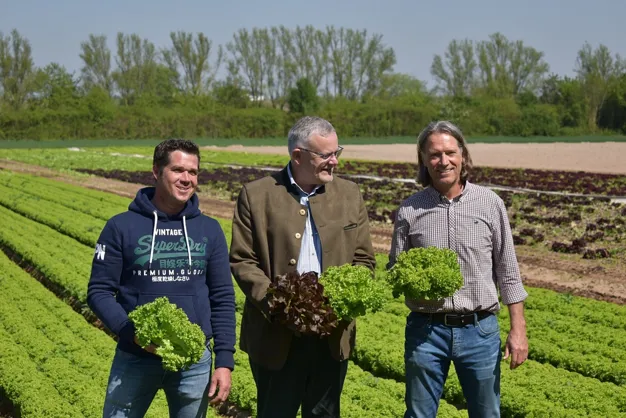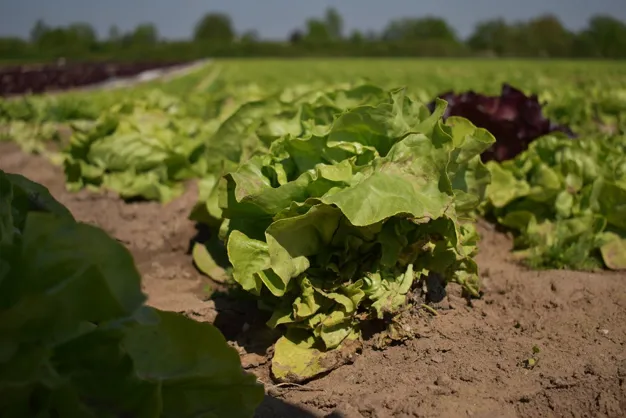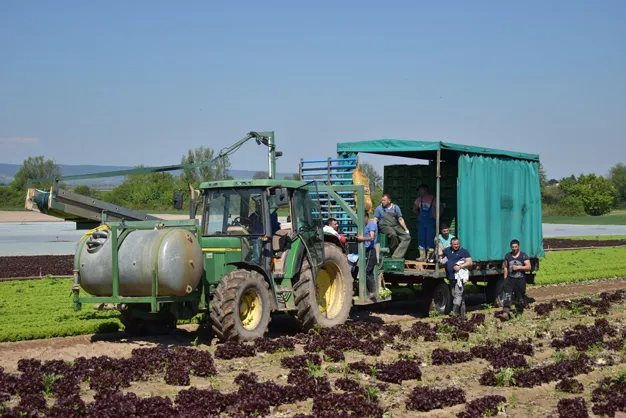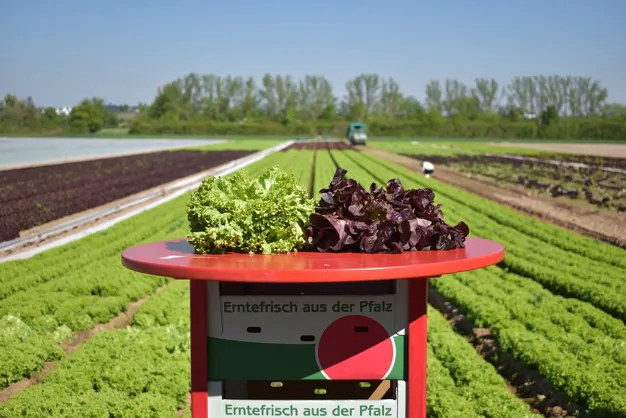At the start of this year's fresh vegetable season, Pfalzmarkt eG invited visitors to the fields of Pfalzmarkt producer Harry Eicher. In addition to Eicher, Pfalzmarkt board member Hans-Jörg Friedrich and supervisory board chairman Christian Deyerling commented on the current season, new trends and the forecast for the season.
In 2021, Pfalzmarkt had sales of 167 million euros with a production volume of 212,000 tons sourced from 13,000 hectares of land. Top products include spring onions with about 85 million bunches, radishes with about 74 million bunches and leaf lettuces with about 45 million heads.

Pfalzmarkt grower Harry Eicher, Executive Board member Hans-Jörg Friedrich and Supervisory Board Chairman Christian Deyerling.
New 30,000 m2 marketing hall
Board member Friedrich is pleased that the Pfalzmarkt will be able to resume almost full operations in the coming weeks. At the start of the new season, the eG can access a new marketing hall of 30,000m2. "We have fortunately started early with the construction work. Because in the meantime there are many difficulties to obtain building materials. We were also afraid that there would be many failures due to Corona. We also stayed within the planned budget in terms of costs. However, on the whole, we had no delays," Friedrich says.
"2021 was a good year. We were able to increase our sales somewhat last year, which is also due to the fact that we are increasingly sourcing goods from abroad for our customers in the winter so that we stay on the ball and don't have to worry in the spring. In this respect, the winter business has also become important," says Friedrich.
"We were able to start the season with good volumes of spring onions because, fortunately, we had no frost. Asparagus has started as early as it has in recent years. We have been able to offer larger quantities of lettuce since mid-April, and I have already spotted the first kohlrabi. From mid-May, we will be able to offer almost the entire product range, except for zucchini," Friedrich predicts.

Competition from Italy and Spain
According to him, the food retail industry is indeed eager to go more locally and to offer products in the "local" category, but this does not only refer to the Palatinate, but to German goods in general. "In this, however, we also have to compete with Italian and Spanish goods because they sell their stock at a lower price. So we are coming to the market with a higher price level, and retailers must be willing to pay accordingly." German produce, however, remains in high demand, he said, which would suit the Palatinate market. "Because what is harvested today, will be on the shelves tomorrow," Friedrich said.
New products
With edamame, puntarelle and broccolini, Pfalzmarkt is also not afraid to market new products. Friedrich: "Of course, we are first trying to establish ourselves accordingly with the new products that we have already introduced to the market, such as broccolini with our Bimi brand. This is already trending in other countries. We will also devote more attention to salads with root balls, i.e. hydroponics. In general, we are always working on new varieties that need to be adapted to the weather."
The three are definitely concerned about the increase in the minimum wage to 12.00 euros, he said. "It may well be that labor-intensive products can no longer be offered," Deyerling said. "The vegetables involve much manual labor. However, we often can not change our prices indefinitely. As a result, we will inevitably lose certain crops to a greater or lesser extent."

Colorful salad mix
Eicher's growing operation was founded in 1970 by his father and was previously primarily devoted to growing lettuce. Eicher then expanded the assortment to include lollo rosso and bionda, as well as red head and romaine lettuces and Chinese cabbage. "We started planting around the end of February and harvesting in early April, although we had to delay the latter by three days due to snowfall. Then, in the summer months, we should be ready to harvest three to four weeks after planting," Eicher says.
For produce, certain weight targets are set by the major grocery chains. "For coloured lettuces, we reach about 200g for red lettuces and 250g for green, while in the summer months red varieties reach between 250-300g and green 350g. Lettuces should have a girth of 400-450g," says Eicher. The farmer was surprised at the refusal of some seasonal workers to come and work.
Germany's vegetable garden
Deyerling, who is a grower himself and keeps track of all 120 farms that cooperate with Pfalzmarkt, shares Eicher's assessment. "The seasonal workers have, of course, the freedom to work where they want. However, I think they are acting a bit short-sighted in some cases," Deyerling said. It's also becoming increasingly difficult to find seasonal workers, due in part to the changeable weather situation. "It rains more often and it also gets quite hot at times. Our seasonal workers naturally go where they can earn the most and where they can work under the best circumstances."
The challenges posed by flooding, heat waves and the pandemic could be managed in the Palatinate region, but new problems were emerging as a result of the war in Ukraine, he said. "The procurement costs of packaging materials, wooden crates, etc. has gone up immensely. If a crate costs twice what it cost before, that should actually be reflected in the price. Another big problem is that the higher consumer prices do not necessarily come back to the producers. That, in turn, can cause further problems in the future," Deyerling states.
At the same time, trends such as local or regional production, freshness and sustainability play into the cards of producers from the 'Germany's vegetable garden'. "Despite everything, consumers tend to focus on staple foods in a crisis. Luxury products such as asparagus are no longer in great demand." Since this would leave a lot of goods lying around, there could be an oversupply, which would result in prices being significantly lower than otherwise.

For more information:
Pfalzmarkt für Obst und Gemüse eG
Neustadter Str. 100
67112 Mutterstadt
info@pfalzmarkt.de
https://www.pfalzmarkt.de
